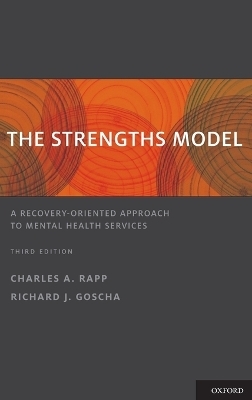
The Strengths Model
Oxford University Press Inc (Verlag)
978-0-19-976408-2 (ISBN)
Presenting a compelling alternative to the traditional medical approach, The Strengths Model demonstrates an evidence-based approach to helping people with a psychiatric disability identify and achieve meaningful and important life goals. Since the first edition of this classic textbook appeared, the strengths model has matured into a robust vision of mental health services. Both a philosophy of practice and a specific set of tools and methods, the strengths model is designed to facilitate a recovery-oriented partnership between client and practitioner. This completely revised edition charts the evolution of the strengths model, reviews the empirical support behind it, and illustrates the techniques and values that guide its application.
Features new to this edition:
- An extensive update of the strengths literature, focusing on recovery as the dominant paradigm in mental health services
- Richly drawn case vignettes demonstrating the application of methods
- Integration of empirical research and consumers' own experiences
- Completely updated strengths assessment and fidelity scales
- In-depth discussions and examples guide practitioners from theory to applied practice
- Descriptions of how to teach and successfully supervise large-scale implementations of strengths model work
For social workers and other mental health specialists working with clients to move beyond the disabling effects of mental illness to a life filled with meaning, purpose, and identity, this remains the crucial text.
Charles A. Rapp, PhD, is Professor Emeritus of Social Welfare and Research Professor at the University of Kansas and Director of the Office of Mental Health Research and Training. Richard J. Goscha, PhD, is Director of the Office of Mental Health Research and Training at the University of Kansas, School of Social Welfare.
Foreword, Patricia Deegan ; Preface ; 1. History, Critique, and Useful Conceptions: Toward a Strengths Paradigm ; 2. A Beginning Theory of Strengths ; 3. The Purpose, Principles, and Research Results of the Strengths Model ; 4. Engagement and Relationship: A New Partnership ; 5. Strengths Assessment: Amplifying the Well Part of the Individual ; 6. Personal Planning: Creating the Achievement Agenda ; 7. Resource Acquisition: Putting Community Back into Community Mental Health ; 8. Supportive Case Management Context: Creating the Conditions for Effectiveness ; 9. Strengths Model Epilogue: Commonly Asked Questions (Objections) ; Appendix I. Spirit-Breaking Behaviors ; Appendix II. Hope-Inducing Behaviors ; Appendix III. Areas to Explore Through the Strengths Assessment ; Appendix IV. Quality Review of Strengths Assessment ; Appendix V. Strengths Model Core Competencies Evaluation Tool ; Appendix VI. Strengths Model Case Management Fidelity Scale ; References ; Index
| Zusatzinfo | 38 line-cuts and 1 half-tone |
|---|---|
| Verlagsort | New York |
| Sprache | englisch |
| Maße | 155 x 236 mm |
| Gewicht | 680 g |
| Themenwelt | Geisteswissenschaften ► Psychologie ► Klinische Psychologie |
| Geisteswissenschaften ► Psychologie ► Persönlichkeitsstörungen | |
| Medizin / Pharmazie ► Medizinische Fachgebiete ► Psychiatrie / Psychotherapie | |
| Sozialwissenschaften ► Pädagogik ► Sozialpädagogik | |
| Sozialwissenschaften ► Soziologie | |
| ISBN-10 | 0-19-976408-5 / 0199764085 |
| ISBN-13 | 978-0-19-976408-2 / 9780199764082 |
| Zustand | Neuware |
| Informationen gemäß Produktsicherheitsverordnung (GPSR) | |
| Haben Sie eine Frage zum Produkt? |
aus dem Bereich


